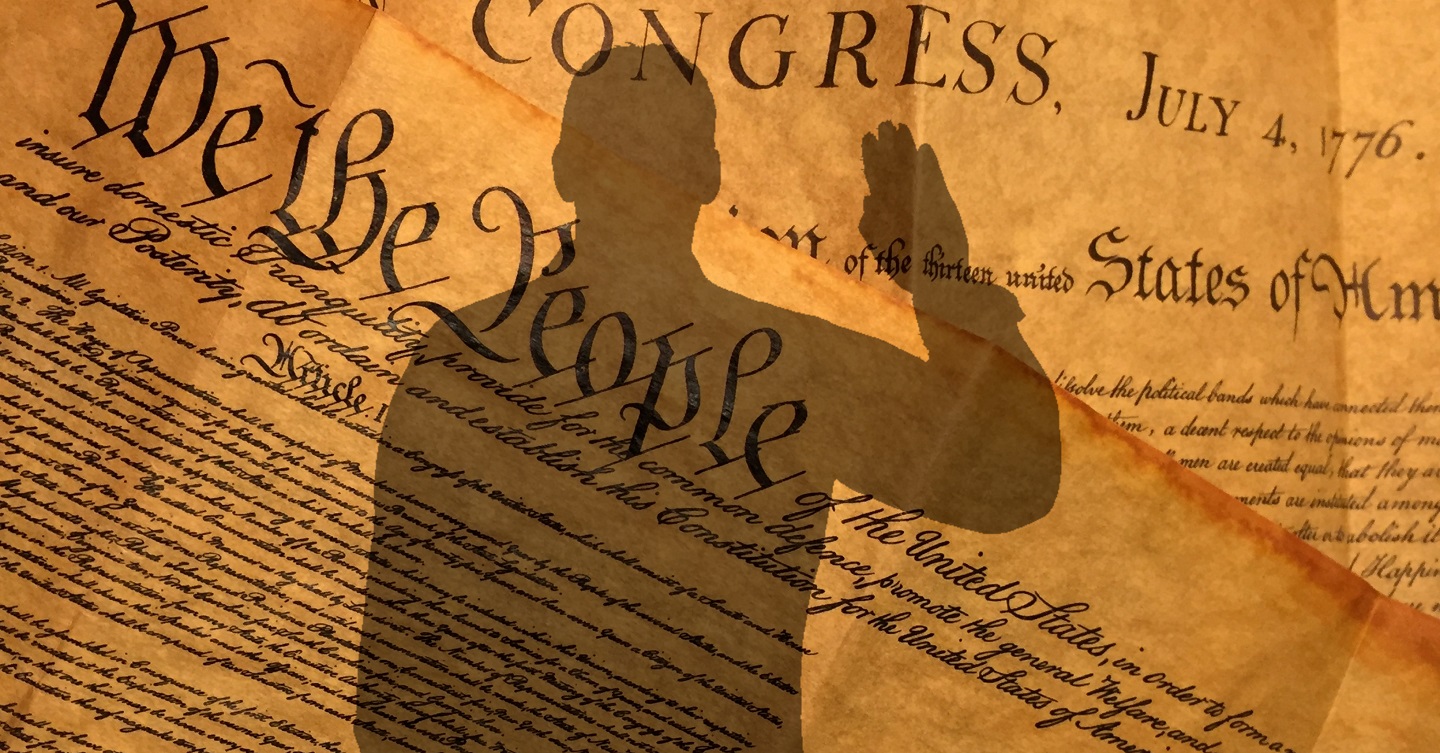
The officiant in such ceremonies often points out to the honoree and to those in attendance that the U.S. military oath of office stands apart from others around the world in that we swear an oath, not to a monarch, nor to a head of state, but to the Constitution.
I first swore an oath to support and defend the Constitution in 2006 at the Old North Bridge in Concord, Massachusetts. It was the “rude bridge that arched the flood,” as Ralph Waldo Emerson put it, where “embattled farmers stood // and fired the shot heard round the world.” There was no Constitution then; only a tacit agreement between the thirteen colonies to throw off the bonds of tyranny. Thomas Jefferson would formalize the language of that agreement the following year. It was the thirteen sovereign states’ duty, he wrote, “to throw off such Government, and to provide new Guards for their future security.” The throwing off—the Revolutionary War—took place from 1775 to 1783, but the new guards would not be in place until the first nine of the thirteen states ratified the U.S. Constitution in 1787 and 1788. It is that document I swore to support and defend against all enemies foreign and domestic at the Old North Bridge in 2006 and now, fifteen years in, I bear true faith and allegiance to the same.
In those fifteen years, I have attended countless enlistment, commissioning, and promotion ceremonies. The officiant in such ceremonies often points out to the honoree and to those in attendance that the U.S. military oath of office stands apart from others around the world in that we swear an oath, not to a monarch, nor to a head of state, but to the Constitution. This much is true. But I have heard several officiating officers follow this statement up with a second: that in the United States military, our oath is to the idea of America. This is false.
On the 6th of January 2021, the Constitution was threatened by “enemies domestic.” Insurrectionists breached the Capitol intending to disrupt Congress’s efforts to “open all the Certificates,” as Article II, Section I of the Constitution requires, so that “the Votes [could] then be counted.” According to CBS News, at least ten percent of the more than 700 people charged in connection with the insurrection have served in the U.S. military. Each of those 81 current or former military service members has—at least once, perhaps several times—raised their right hand and sworn an oath to support and defend the Constitution of the United States against all enemies foreign and domestic.
Most of those who stormed the Capitol and threatened members of Congress did so because they believed it was the right thing to do. I have no doubt that those who participated believed the election was stolen. I have no doubt that they believed—however mistakenly—that they were acting in the best interest of the country. I have no doubt that they committed their violent and illegal acts to defend and secure their own idea of America. But even if all this is true, their actions were at odds with the oath they had previously sworn. When people leave military service, surely they are absolved of their oath. I am not making the strong claim that January sixth insurrectionists violated their oaths of office. I am making the weaker claim that one can believe oneself to be fighting for one’s country while at the same time contradicting the words of the oath.
The oath I swore, and the oath sworn by at least 81 of those charged in the insurrection, was not always to do what I believe to be in the best interest of the country. I did not swear to support and defend the idea of America, or American values, or democratic ideals—because since this country’s founding, serious Americans have disagreed about just what the idea of America ought to be, and which values are American, and which ideals are democratic.
In reality, you and I probably do not always agree about what the idea of America is or ought to be. Biden supporters and Trump supporters do not agree on an idea of America. Jefferson and Hamilton did not agree on the idea of America. Slavers and abolitionists and those held in bondage did not agree on the idea of America—and the country went to war over it. And the iron-sharpening work of disagreeing over and debating ideas about what America is and ought to be has made us better, not worse. Realizing the idea of America has been the work of the country since its founding. But even this debating and sharpening is not that to which I swore an oath. I did not swear an oath to make us better. My oath was to support and defend the Constitution.
Though the words of the oath have changed over time, the requirement that military members swear an oath is established in the very Constitution modern servicemembers swear to support and defend. Article VI, clause 3 says that “the Senators and Representatives before mentioned, and the Members of the several State Legislatures, and all executive and judicial Officers, both of the United States and of the several States, shall be bound by Oath or Affirmation, to support this Constitution.” The very first bill signed into law in the United States in 1789 established language for that oath. “I … do solemnly swear or affirm (as the case may be) that I will support the Constitution of the United States.”
Changes in the oath over time reveal how Americans have thought about duty and obligation to one’s country. Between 1790 and 1862, military members (both officer and enlisted) swore, not to support and defend the Constitution, but to “bear true faith and allegiance to the United States of America, and to serve them honestly and faithfully against all their enemies.” But this oath would prove insufficient against the pressures of civil strife. As soldiers abandoned their positions in the United States military and took up positions in the armies of the Confederacy, surely they violated the spirit of their oaths, but did they violate the letter?
The purpose of the ironclad test was to “ensure that government officials were not supporting, or had not supported, the Confederacy.”
In 1862, in the midst of war, Congress decided the 1790 oath lacked specificity about the threat from enemies domestic, and so they established a new and much lengthier oath for officers. Often called the “Ironclad Test Oath,” federal officials were required to swear that they had “never voluntarily borne arms against the United States” and had “voluntarily given no aid, countenance, counsel, or encouragement to persons engaged in armed hostility thereto.” The purpose of the ironclad test was to “ensure that government officials were not supporting, or had not supported, the Confederacy.” This oath also returned to the 1789 oath’s reference to the Constitution but added something new: “I will support and defend the Constitution of the United States, against all enemies, foreign and domestic.”
Shortly thereafter, in 1868, the officer oath was shortened, removing the ironclad test, and resulting in the oath officers swear today—the same oath I swore at The Old North Bridge in 2006. The enlisted oath underwent additional changes in 1950 and 1962 until, ultimately, it too culminated in a promise, among other things, “to support and defend the Constitution of the United States against all enemies, foreign and domestic.”
It is true that we swear an oath to support and defend a document rather than a person. And, in one sense, this is a startling discovery. In Federalist 74, Alexander Hamilton insisted that to ensure the alacrity that military force demands, the military must submit to a single commander in chief. “Of all the cares or concerns of government, the direction of war most peculiarly demands those qualities which distinguish the exercise of power by a single hand.” And yet, so confident was the first Congress that our loyalty must be to the government as outlined in the Constitution and not to any single part of it, that the military oath was then, and is now, to support and defend the Constitution of the United States.
If we, officials in the federal government, were to abandon the oath we swore to the Constitution because the situation is just too dire, or because our current circumstances are unprecedented; or in the name of ideas, values, and ideals, we would be like the person who swears to love and honor and serve their spouse in sickness and in health, only later to say, “but how could I have known how sick they would get?”
The oath I swore was not to an idea but to words in the English language; engrossed on parchment; augmented with a Bill of Rights; and amended several times since. The actions of the 81 military veterans who participated in the insurrection were at odds with the oath they had previously sworn because they sought—by whatever means—to violate Article II, Section I of the Constitution.
This is not, of course, to say that our oath is to the Constitution as it was written in 1787. Nor is it to say that the Constitution can’t be amended even now. In Washington’s farewell address, he reminds us that “the basis of our political systems is the right of the people to make and to alter their constitutions of government. But the Constitution which at any time exists, till changed by an explicit and authentic act of the whole people, is sacredly obligatory upon all.”
I offer no elixir that will cure us of the many maladies our political community suffers. Instead, I offer but this one method for treating our symptoms: Many who have sworn an oath to support and defend the Constitution, myself included, should spend more time studying the Constitution.
I have been asked to officiate three weddings. Each time, I asked the couple to sit down with me in advance to discuss what their wedding vows mean and why they are important. I have, in the past, been asked to administer the oath of office as well. I regret not insisting upon the same reflection and intentionality in preparing for the oath of office as I have in preparing for the wedding vows. Lt Col Kenneth Keskel, on whose work I have relied heavily throughout this essay, has written that “prior to taking their oath upon commission or reaffirming it upon promotion, too few officers take the time to read and study the document they swear to support and defend.” On this accusation I am guilty. If I am ever again given the honor of administering an enlistment, commissioning, or promotion oath of office, I will ask the honoree to re-read the Constitution, and I will re-read it, too. Just as we do not swear an oath to a monarch, we likewise do not swear an oath to a nebulous political idea. We swear instead to support and defend a real, and solid, and concrete thing.
Joseph Chapa is an officer in the U.S. Air Force and holds a doctorate in philosophy from the University of Oxford. His book, Is Remote Warfare Moral? with PublicAffairs Books will be out in July 2022.
The views expressed in this article are those of the author and do not necessarily reflect those of the U.S. Army War College, the U.S. Army, the U.S. Air Force, or the Department of Defense.
Photo Credit: Constitution Image by Lynn Melchiori from Pixabay





Given the adverse national security consequences of positions taken and comments made by politicians and pundits today, can we look more closely at the idea of “enemies domestic” from that specific point of view?
In this regard, consider the following from the “Politico” article “Conservatives Lash Out at the Military Over ‘Woke’ Policies” by Lara Seligman and Connor O’Brien:
BEGIN QUOTE
Conservatives, including Gorka, also pushed back this week on the new series of Army recruiting commercials designed to reach potential recruits from all backgrounds. One features Malonelord, the Army corporal, discussing her childhood in which she took ballet and marched for equality with her two moms; another ad shows a first lieutenant who immigrated to Florida from Haiti as a child. …
Heidi Urben, a retired Army colonel who specializes in civil-military relations, said Cruz’s claims are damaging to the military’s efforts to stay out of the political fray.
“I found Sen. Cruz’s follow-on tweet, where he tried to claim he wasn’t attacking the military, just as problematic as his original one, when he claimed that ‘Dem politicians & woke media are trying to turn [the military] into pansies,'” said Urben, who now teaches at Georgetown University.
“By labeling the Army recruitment videos as ‘Dem videos,’ he is following a trend of politicians using the military as a partisan football — attacking the military when it’s perceived to be in opposition to their partisan stance and praising it when it appears to be a co-partisan,” she said. “Such comments aim to divide the military — a nonpartisan institution — and the public’s perception of its military.”
Maj. Gen. Alex Fink, director of Army marketing, defended the video series, saying the Army’s success “hinges on our ability to attract the best and brightest our country has to offer, which includes Soldiers from all walks of life.”
“Our new campaign ‘The Calling’ takes an important step in appealing to the next generation — Gen Z — and closing the relatability gap that exists today by offering a rare look at the lives and motivations of those who serve,” Fick said. “We are proud of all five Soldiers who volunteered to tell their stories as part of this campaign, and the Army is proud to have them in its ranks.”
END QUOTE
Bottom Line Question — Based on the Above:
If, as COL (ret.) Urben suggests above, comments made by politicians, etc. (of whatever stripe) “aim to divide the military — a nonpartisan institution — and the public’s perception of its military,”
Then, can these comments — and indeed the politicians, etc., making them — be properly seen from the perspective of “enemies domestic?”
(In this regard, and from a national security point of view, what exactly do we think that our enemies/ our opponents/our competitors today, for example Russia, will think of — and will do with — an understanding that [a] the thoughts expressed by certain conservative politicians and pundits today [b] “aim to divide the military — a nonpartisan institution — and the public’s perception of its military.” ?)
Kinda weird and strange that: 1. No court found any evidence of election fraud after 2020 election;
2. Scared Repubs more scared of POTUS!
If we look closely at certain of our “enemies foreign” and “enemies domestic” today, might we find that that they are but two sides of the exact same “resistance to change” and/or “reverse change” coin? (Note: I will attempt to address “the oath,” as to this such suggestion, at the end of my comment.)
In this regard, consider that what has motivated certain of our foreign enemies over the last two decades and still today (fear of and resistance to unwanted political, economic, social and/or value modernization “change”), this seems to be exactly the same thing that has motivated certain of our domestic population over this exact same time frame. As to this such suggestion, and first from an “enemies foreign” point of view, consider the following:
“Analysts like to talk about ‘indirect approaches’ or ‘limited interventions’, but the question is ‘approaches to what?’ What are we trying to achieve? What is our understanding of the end-state? In a recent article published in Joint Forces Quarterly, I sought to challenge the contemporary understanding of counterinsurgency by arguing that the term itself may lead us to faulty assumptions about nature of the problem, what it is we are trying to do, and how best to achieve it. When we label something a counterinsurgency campaign, it introduces certain assumptions from the past and from the contemporary era about the nature of the conflict. One problem is that counterinsurgency is by its nature conservative, or status-quo oriented – it is about preserving existing political systems, law and order. And that is not what we have been doing in Iraq and Afghanistan. Instead, we have been the revolutionary actors, the ones instigating revolutionary societal changes. Can we still call it counterinsurgency, when we are pushing for so much change?”
(From the Small Wars Journal article “Learning From Today’s Crisis of Counterinsurgency” by Octavian Manea — an interview with Dr. David H. Ucko and Dr. Robert Egnell.)
Next, as relates to an “enemies domestic,” consider this following:
“Liberal democratic societies have, in the past few decades, undergone a series of revolutionary changes in their social and political life, which are not to the taste of all their citizens. For many of those, who might be called social conservatives, Russia has become a more agreeable society, at least in principle, than those they live in. Communist Westerners used to speak of the Soviet Union as the pioneer society of a brighter future for all. Now, the rightwing nationalists of Europe and North America admire Russia and its leader for cleaving to the past.”
(See “The American Interest” article “The Reality of Russian Soft Power” by John Lloyd and Daria Litinova.])
In both of the quoted items that I provide above, note how the terms “revolutionary changes” and “revolutionary societal changes” were used; this, to describe, first the “change” foreign, and next the “change” domestic, policies of the U.S./the West.
Bottom Line Question — Based on the Above:
The problem, therefore, for Americans who have (a) sworn the oath to the Constitution but (b) disagree with the “revolutionary societal change” foreign and/or the “revolutionary societal change” domestic policies of the United States (noted above), this is that they (c) cannot act on such disagreement; this, (d) in a way that violates their such oath?
Your argument addresses the fundamental question about what service members are obligated to due under the oath they took. Figures by George Washington University identify 87 people charged in the January 6th insurrection as having connections to the military. Most (79 people) are veterans. The remaining 8 are guard, reservists, or active duty. Your argument resonates more clearly to me when considering the obligations of those who are currently serving in some capacity, though I have questions about the obligations of guard and reserve service members. In any case, it seems false to claim that veterans are beholden to the same obligations under the oath as active, guard or reserve service members. Why should we think that a person who swore the oath, for instance, 15 years ago and only served for 4 years should still be held responsible for defending the constitution? I agree with the sentiment of your argument and the conclusion that service members (including veterans) who participated in the Capitol attack acted wrongly and in a distinct way from the wrongfulness of the civilian participants. I disagree with the premise that it’s because they, at one point in time, took an oath to defend the constitution. In this sense, I think you’re actually making a much stronger argument than you indicate.
The author seems to know the constitution but not the circumstances surrounding its creation. The “govt” has, many times in the history of the United States, sent troops against “peacefully protesting” veterans (and civilians alike) whose ‘right to redress’ their grievances against their govt is supposedly protected in the same constitution they swore to defend (Doug MacArthur being the most notable). What then should these individuals do when the govt tramples their rights with little to no chance of redress? Recall that the concerns of Madison and many of his contemporaries (Brutus) were that the rights (and of Virginians, and others may be ‘trampled by congress whose powers towered over those of the individual states.’
The oath is a contract between the soldier and the govt. in that the they both preserve the constitution, with the soldier bearing the brunt of this “protection”…what recourse does the individual have when the govt. does not honor the ‘agreement’ or changes the rules in the middle of the game?
When did the Oath have the phrase, “…to obey the orders of the President and lessers officers appointed over me…”, change/get omitted?
Let me guess…under Bush 43 or Obama.
When was the January 6, 2021 protest declared an “Insurrection”?
By what instrument?
No respect intended Sir, your words are inflammatory and defamatory in my opinion.
Further, if you believe the election was legitimate, perhaps you should consider a new line of work.
I am ashamed to admit you are one of my brothers.
a little bit to complicated for the average person. also the question comes up as to the validity of an election by people who may not be united states citizens. a valid I D must be required. again the answers must be found in the constitution itself.
The writer’s assertion that those who were invited in by capitol police to visit the capitol were domestic enemies is pure fiction and propaganda. The writer should be advised that The people are not all Stupid, that SCOTUS 22-380 is being refiled to remove the corruptocrats who are in fact enemies of the Constitution, and that those who adhere to these people will be found complicit and suffer consequences.
Several States ran and certified unconstitutional 2020 elections proven by Documented facts, reference the 117th Congressional Record of January 6th 2021 it clearly shows both chambers had members commit Sedition.Then understand Articles 1&2. The US Supreme Court abrogated their duty because they claim there was no standing or merit. Their Sedition is proven because Stare Decisis was established by McPherson vs Blacker and Bush vs Gore. Because Secretaries of States changed their particular State’s election manners ( laws) and courts changed their particular State’s election manners ( laws) and the State’s particular government certified those unconstitutional elections prove their Sedition. The destruction of ballots by GA government employees shows they are co-conspirators and committed Sedition. Because Wisconsin Election Commission used the US Mail to influence the breaking of Wisconsin election manners ( laws) and no one was prosecuteded shows the D.O.J. as co-conspirators and guilty of Sedition. Next courts ruled both PA & Wisconsin use of drop boxes were unconstitutional and not to use them unless proper changes to the States Constitutions were made means the previous 2020 elections were unconstitutional proving my prima facie case of Sedition against many government employees. Next the unconstitutional Biden Administration used US government assets to blow up a pipeline, now you have not only the US military being tolts about the US Constitution they swore to defend commit an act of terrorism ( act of War). The US Military is guilty of Sedition because the US Military personnel do not understand the US Constitution, US Common law( Court precedent) & law maxims. The Biden Administration was placed in power unconstitutionally usurping the US government supported by the US Constitution so his administration has no authority or protections allowed by the US Constitution proven by US Common law( US Court Precedent) Norton vs Shelby County , Nunn vs GA & Miranda vs AZ all prove laws or actions done unconstitutionally are null & void, they are worthless, they CREAT NO OFFICE, give no protection or authority to act. Alliance is established by taking the Oath of Office or the US Military Oath. So actions done contrary to the US Constitution are grounds for removal from office and possibly criminal prosecution. Next the Biden Administration and Pentagon officials committed Treason defined by the US Constitution by providing US Military equipment to known enemies of the United States. Yet the US Military worry about pronouns and other dumb shit. I took the US Military Oath, I know what it means, and I was in DC on January 6th 2021. I have given a sworn statement to the FBI,January 6 committee and different US elected officials. Several States of the Union ran and certified unconstitutional 2020 elections and I can provide the documentation to prove what I say. It is an Open & Obvious, black & white Sedition and Treason carried out by Treasonous Traiditorous Rats and the US Military helped carry out Terrorism and unconstitutional war acts. Dumb and shameful. Steven A. Colon, I am not hiding from nobody. Giving the criminals two middle fingers.
The Constitution states:
“Each State shall appoint, in such Manner as the Legislature thereof may direct, a Number of Electors, equal to the whole Number of Senators and Representatives to which the State may be entitled in the Congress: ”
In all but the state of Pennsylvania, the Covid-19 inspired election rules/methods were changed by the executive branch, not by the state Legislature. Thus they were unconstitutional. In the case of Pennsylvania, the legislature did change the rules, but the changes were not in conformance with the State constitutions provisions, so in violation of the State Constitution, and thus invalid.
The “insurrection” was intended to be a petition, as in the First Amendment, to the Congress, to evaluated the legitimacy of those elections.
I’ve been looking into oath of the us Constitution.and reap repercussions of not honoring your oath by police politicians, and American citizen.so I’m at a roads end .as for what my generic intelligence tells me and I’m bum cause I really thought our Constitution was our countries anchor it’s just ink on paper that is use to fool people of all walks it’s just a matter of time before they pull it and it all comes down 9/11 was just a taste.the one thing I knew would save us my American is Fake as hell.
I served with Strategic Air Command, 351st SMW, as an NCO. I find the author’s assessment of Jan 6th disgusting. Patriots were set up and suckered in that day, all according to Pelosi’s plan. If the author were in front of me right now, me at the age of 72, I’d spit right in his face.
Being both former USN (enlisted) and a newly minted American Citizen, I’ve sworn that oath twice and whole heartedly meant it both times. I wasn’t aware of any expiration date and so I continue to hold my oath sacred. It astounds me how many times I have had to remind other former military members of their oath to our Constitution when they’ve sent ugly, chain emails full of lies and hate disparaging one group or another, groups of people who are absolutely protected by our Constitution. We are seeing a sad decline in tolerance of other races, religions, and ideas. It’s heartbreaking. Thank you for your essay, it reminds me to stand fast and encourages me to hold my oath even closer to my heart.
An insurrection is characterized by charismatic leaders, a long train of usurpations, denial of justice, development of action groups, a plan, rallying support, planning, guns, a plan to subvert or displace the military authority and selected members to install for the assumption of a new government. Provisions that were not in action that day in January when Mike Pence refused to exercise his legal and moral responsibility and contest and investigate. That years later was irrefutably found to be stolen by the actions of foreign powers, the American Marxists and Obama plants that refused to enforce federal election laws. Try not to pull a John Steinbeck by weaving a fanciful narrative interlaced with subjective conclusions based on ill-formed observations.
AMEN!!!! I swore an oath to protect and defend the constitution against all enemies, foreign and “DOMESTIC’ there was no insurrection on January 6th. it was a peaceful protest with acts of violence orchestrated by the government. the government murdered our fellow veteran, Ashley Babbitt. Her death will not be in vain and the election theft and treason will not go unpunished. THE PEOPLE ARE COMING, AND WE’LL BE BRINGING SOME JUSTICE WITH US